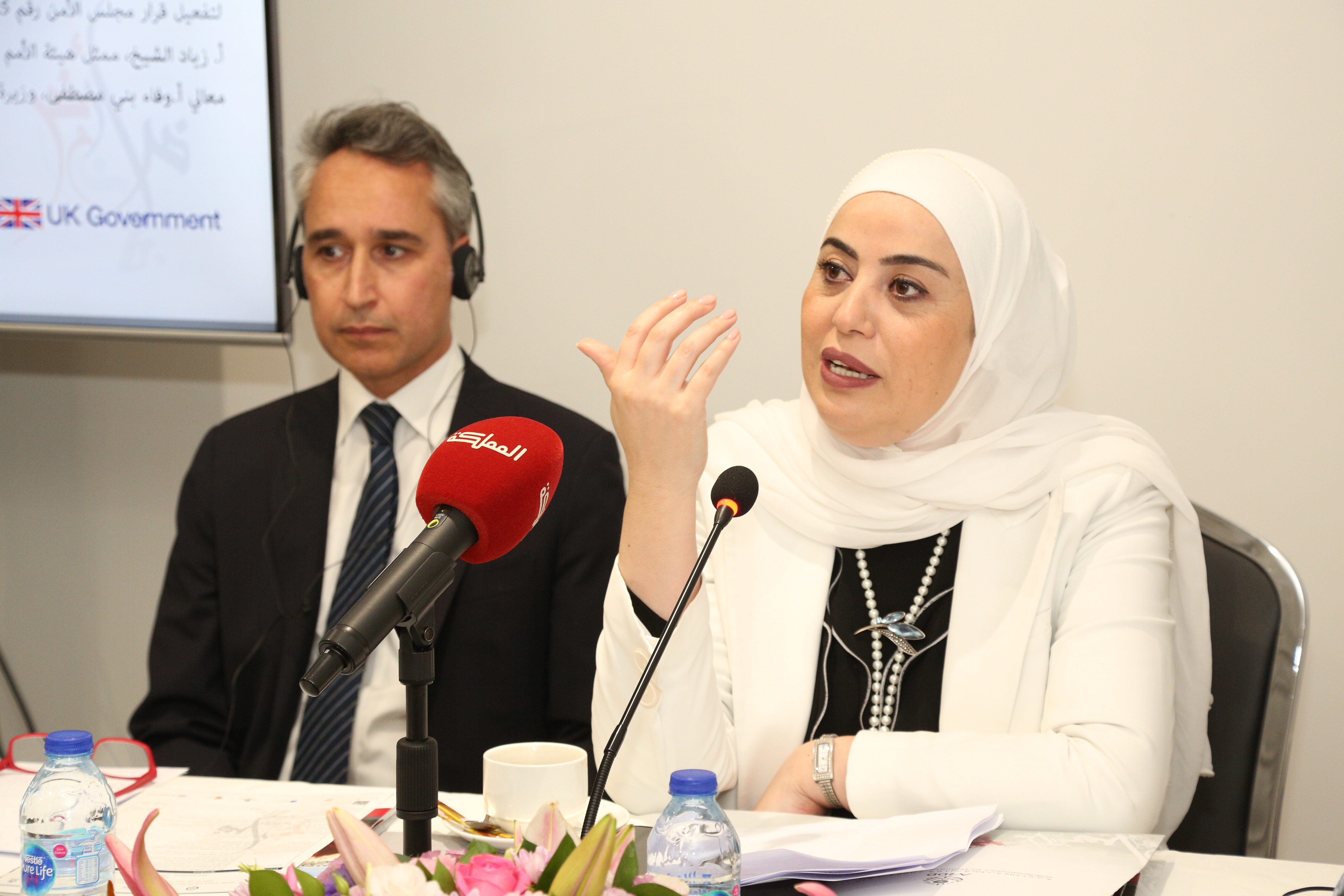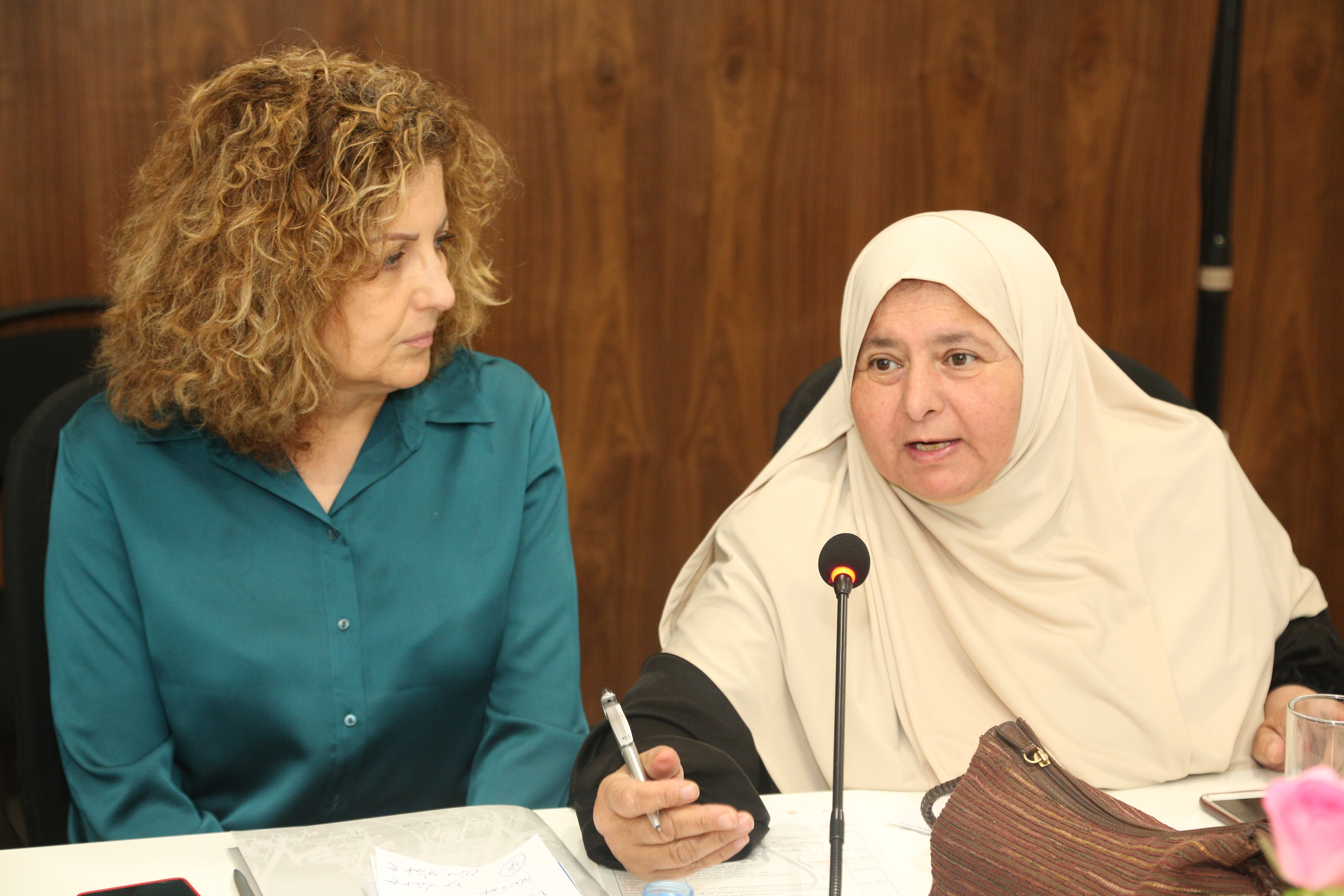ARDD holds meeting on advancing the localization of UNSCR 1325 on Women, Peace and Security
Date:

A roundtable on "Gender Justice and UNSCR 1325 on Women, Peace and Security" was held on Monday, 30 May 2022, by ARDD, under the patronage of H.E. Ms. Wafa’a Bani Mustafa, Minister of State for Legal Affairs and Chair of the Inter-ministerial Committee for Women’s Empowerment, and in partnership with the UN Women. Participants discussed advancing the localization of UNSCR 1325 on Women, Security and Peace within the Jordanian National Action Plan (JONAP), including measures to ensure women’s participation in decision-making processes, their roles in peace and security and issues related to protection in relevant United Nations reporting systems and program implementation mechanisms.
Speaking at the meeting were Ms. Samar Muhareb, Chief Executive Director, ARDD, Ms. Sana’a Al-Banawi, Information and Knowledge Management Specialist for JONAP at the Jordanian National Committee for Women (JNCW) and Mr. Ziad Al Sheikh, Representative, UN Women Jordan.
H.E. Ms. Wafa’a Bani Mustafa spoke about the importance of advancing the UNSCR 1325 locally, with consideration to the context, to ensure its effective implementation. She also highlighted women’s suffering at times of wars and crises, when inequality and discrimination against women are higher, increasing their vulnerability, as well as the fact that even though women are disproportionately affected, they are essential in processes towards establishing peace and security, a fact that is rarely taken into account.
She also emphasized on the importance of working with partners in the second phase of JONAP through an inclusive process, increasing the number of women in political and security positions and enhancing their participation in peacekeeping to ensure localization successfully in the second phase of the JONAP.
According to H.E. Bani Mustafa, more important than enacting laws is ensuring accountability when it comes to implementing them.
“We should not be overwhelmed by the process of enacting laws, or consider it sufficient, but make sure that they are properly implemented, and that sufficient budget is allocated for their application,” she said.
Ms. Muhareb considered the last 10 years being difficult, saying that during this time “We got to know many women in Jordan whose lives have changed several times due to various crises”.
She stressed the importance of partnerships and coordination, which significantly impacts the implementation of UNSCR 1325, adding, “During our work, many things were achieved, while some needed, immediate and strategic objectives were not, which proves that we have to work harder and innovate as much as possible, especially since challenges still exist.”
Ms. Al-Banawi spoke about the importance of civil society and its key role in establishing and contributing to the global terminology surrounding women, peace and security, which in turn supports the implementation of local plans advancing UNSCR 1325.
“Participatory work and a holistic approach were a great motivation to create a national and feasible plan,” said Al-Banawi, adding that the JNCW commends the Jordan National NGOs Forum (JONAF), recognizing its important role in addressing the local priorities and the impact of the pandemic.
Mr. Sheikh spoke about moving forward in an integrated manner, building on the impressive results achieved from implementation of the first phase of JONAP, which brought relevant stakeholders together.
He thanked the governments of United Kingdom, Canada, Finland, Norway, Spain and Cyprus for supporting JONAP.
Dr. Sanaa Jelassi, Senior Adviser for Gender Justice, and Youth Programs at Al Nahda Research and Thought Center, reviewed the main results of the participatory research and policy briefs prepared in cooperation with JONAF within the framework of the “Strengthening Capacities of Women-led Civil Society Organizations on Evidence-Based Advocacy and the Women, Peace and Security Agenda” project, which has been implemented partnership with UN Women since 2019. The project included the preparation of four research papers and ten policy briefs concerning the pandemic and its consequences, which dealt with the issues of women’s financial fragility and debt, the redistribution of care work in Jordan, the localization of research on domestic violence, and the adoption of a local approach to humanitarian action to assess and address these challenges.

The attendees also discussed the lessons learned around enhancing the UNSCR 1325, agenda, especially the experience of JONAF in responding to and reaching local communities during the crisis, the roles of the civil society, intersectionality of UNSCR 1325, among others.
The meeting issued several recommendations including continuing to work at all levels to support UNSCR 1325 agenda, leveraging partnerships between Government agencies, civil society organizations and the security sector and ensuring support towards the sustainability of localization efforts.
In her concluding remarks, Ms. Muhareb stressed the importance of continuing the dialogue to achieve harmony among the various parties concerned, ensuring the participation of women in maintaining security, stability and peace and building the capacities of workers to participate and contribute meaningfully to humanitarian and development work.
Available in Arabic here.